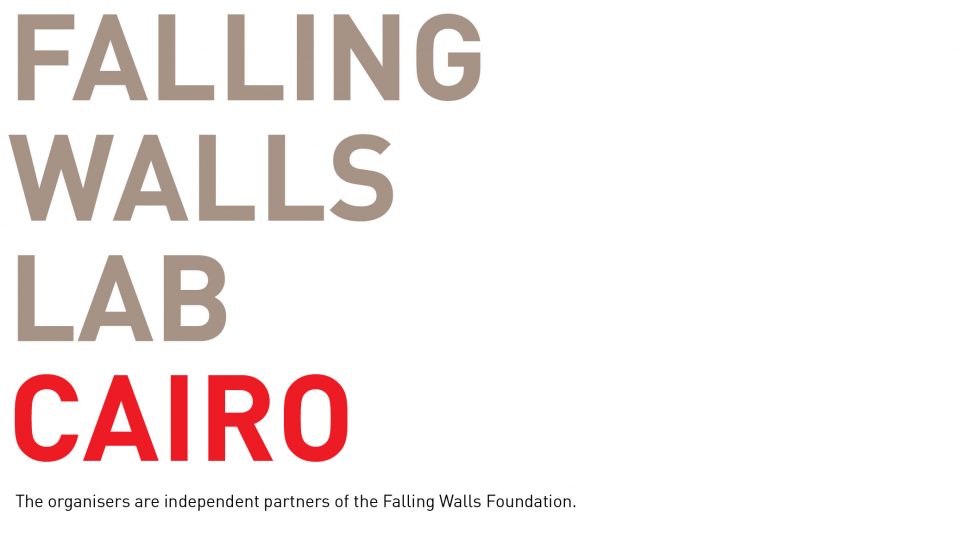Falling Walls Lab Cairo 2021 – Call for Applications

Falling Walls Lab Cairo calls for talented researchers and professionals to showcase their most innovative ideas. Outstanding researchers, entrepreneurs and professionals can now apply for the Falling Walls Lab Cairo on 14 July 2021 to present their idea in 3 minutes. Applications must be submitted by 1 June 2021!
Every year, international Falling Walls Labs take place all over the world and call for the application of Bachelor and Master students, postdocs, young professionals, entrepreneurs and junior professors. Ground-breaking research projects, initiatives, ideas and business models from all disciplines are welcome.
The winner of the local Lab gets to attend the final event Falling Walls 2021 on 8 November in Berlin and increase their project’s global reach and visibility. The travel costs will be sponsored by the DAAD Regional Office Cairo.
The Falling Walls Lab Cairo will take place on the Thursday, 14 July 2021, 7:00 PM. The Lab will be held as a virtual event. Therefore, it will take place remotely with all jury members, participants and viewers attending the event online.
We are looking forward to receiving your application!
Application Procedure
The application procedure includes two steps:
- Applications are made centrally on the Falling Walls Website.
- Application videos in MP4-format of 3 minutespresenting the idea or project and showcasing the ability to present in English by one person (the presenter must be visible), are sent to falling-walls@daadcairo.org. Please visit this forum to get some inspiration.
Only complete application sets will be considered!
For more information about the application, please visit the Falling Walls Website. You will find the report about last year’s event on the website of the DAAD Regional Office Cairo.
If you have any questions, please do not hesitate to contact fallingwalls@daadcairo.org or the Falling Walls Foundation.
About the Falling Walls Foundation
The Falling Walls Lab is organised by the Falling Walls Foundation and generously funded by the German Federal Ministry of Education and Research, the Berlin-Senate, the Bayer Foundations, Huawei, Google, and Sartorius. It is supported by the Federal Foreign Office of Germany and the German Academic Exchange Service (DAAD). The Falling Walls Foundation is a non-profit organisation that fosters the discussion on research and innovation and promotes the latest scientific findings among a broad audience from all parts of society. It organises the Falling Walls Conference, an annual global gathering of forward-thinking individuals from over 75 countries. Each year on 9 November, 20 of the world’s leading scientists present their current breakthrough research in 3 minutes each.
About the German Academic Exchange Service (DAAD)
The DAAD is the world’s largest funding organisation for the international exchange of students and researchers. Since it was founded in 1925, more than 1.9 million scholars in Germany and abroad have received DAAD funding. The DAAD is a registered member’s association made up of German institutions of higher education and student bodies. Our activities go far beyond simply awarding grants and scholarships. The DAAD supports the internationalisation of German universities, promotes German studies and the German language abroad, provide developing countries with best practices in establishing universities and advises decision makers in cultural, educational and developmental policy.
The DAAD Regional Office Cairo was established in 1960 on the basis of the German-Egyptian Cultural Agreement. Since then, the academic relations between Egypt and Germany have evolved steadily. The close cooperation has unwrapped new horizons for the scientific bonds of both countries to further develop and flourish. Thousands of Egyptian scholars have benefited ever since from these ties. Throughout its 60 years in Egypt, the DAAD Regional Office Cairo has been offering a platform for networking, cooperation and research activities between Egyptian and German universities and research institutes to implement hundreds of projects which are of mutual interest. In 2016, the office’s responsibilities also grew to oversee Sudan as well.
















